Editorial
Chase ends in surrender

Deshabandu Tennekoon, the suspended Inspector General of Police, surrendered to the Matara Magistrate last Wednesday after leading the force he once headed on a merry chase for some 20 days, resulting in a lot of egg on the face of the police. He did so after unsuccessfully moving Court of Appeal earlier in the week seeking a writ order to prevent his arrest. This was obviously a last ditch attempt which failed. No doubt fearing that he could not hide for ever, Tennekoon turned up at the court house early on Wednesday morning, reportedly in a Benz car although there is no confirmation of that, staying in the court room until his case was taken up later in the day.
Although we believe the police could have arrested him when he turned up in court, as is known to have been done in the past, that did not happen. Tennekoon would have no doubt been prepared for such an eventuality. The prosecutor went on record that the fugitive should have been in a holding cell rather than seated in the open court room. At the end of the day he was remanded till April 3 and taken away to the Angunukolapelessa jail under special escort by the prison authorities who have been directed to ensure his safety in custody. This is an obvious precaution given the suspect’s notoriety and it was not long ago that a suspect was shot dead as he stood on a courtroom dock. Also, many grudges are known to have been settled in jail in the past.
Deshabandu Tennekoon is not the only high profile fugitive who has recently evaded the long arm of the law. Readers will no doubt remember that the woman accomplice, disguised as a lawyer, who smuggled in the firearm used in the recent court room killing in a hollowed out copy of the Criminal Procedure Code, is not yet in custody although an attractive reward for finding her has been offered. Notably no such inducement was offered by law enforcers for the arrest of their fugitive chief. But a lot else has been done in searching his home where some 795 bottles of foreign liquor and 214 bottles of wine had been found. These salacious details were presented to parliament last week by Public Security Minister Ananda Wijeypala who is the political authority responsible for the police. Since we are now into a New Year and Christmas was only recently past, Tennekoon probably received these as gifts which are customary in this season particularly to those holding high office and others who can do favours. The minister, no doubt, derived much satisfaction in revealing these details to parliament just as much as his cabinet colleagues have relished exposing misdoings of predecessor governments during the ongoing committee stage on the 2025 budget debate.
It is not unusual for police to take family members of wanted suspects as hostages until the quarry is either arrested or surrenders. This was not done in Tennekoon’s case although his family had been questioned about his whereabouts. Also there have been other past instances of high profile wanted suspects evading arrest for much longer periods than the suspended IGP. One such was Rear Admiral Royce de Mel, a former commander of the then Royal Ceylon Navy, who was wanted in connection with the abortive 1962 coup d’etat. De Mel successfully evaded arrest for several weeks before he was surrendered to the specially created trial-at-bar that tried the accused by his counsel, GG Ponnambalam Q.C. Many years after de Mel’s death, details of where he hid in a remote plantation bungalow were published in the media.
While Tennekoon was in hiding, there were threats of confiscation of his property and punishment to those who helped him were made although it was not clear whether such measures were enforceable or not. The public will now have to await the unraveling of the usually prolonged legal process before being able to see where this matter will eventually end. But it is patently clear that Deshabndu Tennekoon’s was a rank bad appointment to the position of IGP. He had been found guilty of torture by the supreme court in December, 2023 in what was described as a “historic judgment” where it was held that he was “personally responsible” for acts of torture against a suspect in custody. Before this judgment there were other allegations of his being complicit in attacking peaceful protests and making death threats to journalists and much more.
Former President Ranil Wickremesinghe resisted appointing Tennekoon as IGP extending the tenure of his predecessor, CD Wickremeratne for three month periods several times before he caved into demands by a Tennekoon patron before finally making the appointment. But this also necessitated some sleight of hand at the Constitutional Council (CC) which had to approve the appointment. Then Speaker Mahinda Yapa Abeywardene counted the votes of two absent members of the CC as noes (rather than absent) against Tennekoon declared a tie and then registered his own casting vote to record approval.
This demonstrated that even the checks and balances safety mechanism of the CC has been aborted for a clearly bad appointment to be made. It is to be hoped that such unfortunate situations will not be allowed to arise in the future.
Editorial
Another arrest

Friday 28th March, 2025
The Commission to Investigate Allegations of Bribery or Corruption (CIABOC) arrested New Democratic Front MP Chamara Sampath Dassanayake yesterday over some alleged financial irregularities during his tenure as the Chief Minister of the Uva Province about nine years ago. The national anti-graft commission is often blamed for slumbering or netting sprats while sparing sharks when it deals with the corrupt. Its action against the likes of Dassanayake is welcome.
The CIABOC, however, should explain why it let the grass grow under its feet for so long before taking action against Dassanayake. Or, has it acted on a complaint made against him recently? If so, the complainant owes an explanation to the public as to why he or she took so long to move the CIABOC against him.
The presence of the likes of Dassanayake in politics has made the public think less of politicians. But it is difficult to get rid of such characters electorally because Sri Lankan voters are swayed by factors such as caste and patronage. Crafty politicians enter Parliament by leveraging pockets of support scattered across electoral districts. The Proportional Representation system has stood them in good stead; it enabled them to survive last year’s ‘maroon wave’.
It is being argued in some quarters that MP Dassanayake was arrested because he is at the forefront of the Opposition’s anti-government campaign, and the JVP/NPP government will have all its critics in Parliament arrested to suppress dissent. This argument is not without some merit, given Dassanayake’s scathing attacks on the government, and the sullied history of the CIABOC, which has blotted its copybook on numerous occasions by launching politically motivated investigations against the Opposition politicians, and opening escape routes for ruling party members who face legal action. So, the Opposition may be able to cast suspicions on the integrity of the CIABOC investigations against its members.
What we have been witnessing on the political front during the past several months resembles a replay of the early stages of the Yahapalana rule, which was characterised by numerous arrests. A large number of political rivals of the UNP-led Yahapalana government were summoned, questioned and arrested by the CID, which then bussed them to courts, some of which were kept open until midnight! Most of those suspects were remanded and prosecuted, but none of them were sent to jail.
Under the current dispensation as well, the police go hell for leather to make arrests, but most suspects obtain bail. It may be recalled that the CID went so far as to send a team from Colombo all the way to Beliatta to arrest former President Mahinda Rajapaksa’s second son, Yoshitha, in January 2025. It could have asked him to visit its headquarters and make a statement, or even arrested him in Colombo itself.
The police have also recorded a statement from Yoshitha over a recent nightclub brawl, where several persons described as his associates set upon a bouncer. Before last year’s elections, the JVP-led NPP had the public believe that it would take stringent action against all lawbreakers, especially the perpetrators of serious crimes. But today the NPP is floating like a bee and stinging like a butterfly in a manner of speaking. It said it had more than 400 files on various corrupt deals involving its political rivals. What has become of them?
Let the police be urged to concentrate more on probing grave crimes such as the assassinations of The Sunday Leader Editor Lasantha Wickrematunge and popular rugby player Wasim Thajudeen. If such emblematic crimes can be solved without further delay, the government will be able to ensure that some politicians currently out of power and their kith and kin are sent to jail.
Editorial
The ultimate test of patriotism

Thursday 27th March, 2025
Former President Ranil Wickremesinghe has reportedly said Sri Lanka’s economy still needs intensive care, and much more remains to be done to ensure its full recovery. He has emphasised the need for the incumbent government to tread cautiously on the economic front and secure foreign investment to sustain growth momentum. He has been critical of the manner in which prospective foreign investment in the power and energy sectors is handled under the current dispensation. Pointing out that investment and technology are driving the economies of countries such as China and India, he has called for measures to secure them to enable Sri Lanka’s economy to come out of the woods.
Contrary to the incumbent administration’s contention that its immediate predecessor under Wickremesinghe’s presidential watch did precious little to straighten up the economy, Wickremesinghe had the courage to make several highly unpopular yet vital decisions to resuscitate the economy. The JVP/NPP lambasted his approach to economic crisis management, and even resorted to ageist slur, calling him a ‘seeya’ (grandpa), who was not equal to the task of putting the economy back on an even keel, but ‘seeyanomics’, as it were, helped break the back of the economic crisis so much so that the JVP/NPP administration opted to continue with the last government’s economic recovery strategy as well as the IMF bailout programme.
Wickremesinghe’s unwavering political leadership for stabilising the economy, however, did not help boost his party’s electoral performance owing to his political wrongs, which were legion; he succumbed to the arrogance of power and unflinchingly defended the corrupt. Thankfully, the JVP/NPP has disappointed its critics who expected it to upend the IMF programme, advance its outdated Marxist agenda, and plunge the country into chaos again.
The SJB is critical of the manner in which the JVP/NPP government is handling the economy, and claims that it would have done much better if it had been voted into power. But it is of the view that the country has to stick to the IMF bailout programme, albeit with some changes, which, we believe, are not in the realm of possibility because Sri Lanka lacks bargaining power. Beggars are said to be no choosers. There is reason to believe that despite its rhetoric, the SJB would have had to do exactly what the JVP/NPP is doing at present in respect of the IMF programme and economic management if it had been able to form a government last year.
In the final analysis, President Anura Kumara Dissanayake, Wickremesinghe and Opposition Leader Sajith Premadasa see eye to eye on the need to ensure the continuity of the ongoing economic bailout programme. So, the question is why they do not sink their political differences and put their shoulders to the wheel to revitalise the economy.
After all, President Dissanayake during his talkathon on the final day of the budget debate in Parliament, last week, made a very passionate appeal. He said the government and the Opposition had differences and could take on each other to settle political scores, but they had to make common cause on the economic front for the sake of the country. One could not agree with him more. Political battles must not be fought at the expense of the economy. If only the JVP/NPP had practised what it is now preaching to its political rivals when it was in opposition.
Progress has eluded this country because successive governments have played politics with economic management instead of formulating national policies and strategies and adopting a consistent approach to economic management, the way India has done; the Indian economy has doubled to over $4 trillion during the past decade, according to latest IMF data.
The most effective way to build investor confidence and attract foreign investment is for the main political parties, their leaders, and other key stakeholders, especially Dissanayake, Wickremesinghe and Premadasa, to speak with one voice in respect of economic management and investment plans and strategies. Will they do so and prove that their much-avowed love for the country is genuine and not fake?
Editorial
Presidential blusters and legislators’ ire

Wednesday 26th March, 2025
The Opposition has taken umbrage at President Anura Kumara Dissanayake’s talkathon, as it were, in Parliament last Friday, when the final vote on Budget 2025 was held. Some SJB MPs have claimed that the Chair had their microphones switched off so that the President could hold forth uninterrupted, and he used the budget as an excuse for haranguing the House. The government MPs have sought to counter this argument. They insist that President Dissanayake, as the Minister of Finance, only exercised his constitutional right to address the House on the final day of the budget, and there was nothing wrong with it whatsoever.
There have been numerous instances where the legislature became a captive audience for the Executive Presidents—and even loquacious Prime Ministers and Opposition Leaders. Sri Lankan politicians have a propensity to talk nineteen to the dozen just to hear their own voice. However, there is more to the recurrent argy-bargy over presidential grandstanding in Parliament than the Opposition’s aversion thereto; the tendency of the Executive Presidents to subject the legislature to their loquacity can also be seen as symptomatic of the erosion of the separation of powers.
What has fuelled the ongoing campaign for the abolition of the executive presidency is that the Presidents tend to act like harum-scarum private bus drivers when they have control over Parliament. They tend to bulldoze their way through. The situation becomes even worse when the Presidents’ parties happen to have supermajorities in Parliament.
The Executive Presidents are compelled to act with some restraint when parties other than their own gain control over the legislature, as evidenced by the experiences of President D. B. Wijetunga from August to November 1994, President Chandrika Bandaranaike Kumaratunga from 2001 to 2004, and President Maithripala Sirisena from October 2018 to November 2019. Presidents J. R. Jayewardene, Mahinda Rajapaksa and Gotabaya Rajapaksa, by virtue of being the leaders of the ruling parties with supermajorities, reduced the Legislature to a mere appendage of the Executive. President Ranasinghe Premadasa also did likewise although his party did not have a two-thirds majority in Parliament. This unwholesome practice has continued over the years without a hiatus.
The constitutional requirement that the Executive Presidents attend Parliament once every three months, along with their power to address the legislature and hold Cabinet portfolios, has enabled them to dominate—if not undermine—the legislature. Some Presidents have leveraged their power to address Parliament to project their authority and overshadow legislators. One may recall that the last Parliament had the then President Ranil Wickremesinghe walking in, making speeches, and even asking some Opposition MPs to shut up.
The JVP, a bitter critic of the executive presidency, has pledged to abolish it. Its leaders made their support for Mahinda Rajapaksa in the 2004 presidential race conditional to his pledge to scrap the executive presidency. He, true to form, reneged on his promise. The JVP was also instrumental in having the 17th Amendment and the 19th Amendment to the Constitution introduced to curtail the powers of the Executive President. The 21st Amendment, which did away with some of the presidential powers, restored by the 20th Amendment, was also introduced partly due to JVP’s pressure exerted through Aragalaya (2022). Unfortunately, the Constitutional Council, which was created to fetter the excessive executive powers of the President, has become a rubber stamp for the Executive.
Today, the JVP has a two-thirds majority in Parliament and boasts of having expanded its support base across the country. Curiously, not much is heard about its pledge to abolish the executive presidency.
During an interview with the government-controlled ITN, on 04 Dec., 2024, in answer to a question about the JVP’s promise to scrap the executive presidency, JVP Central Committee member, legal advisor and Deputy Minister Sunil Watagala, said that the JVP/NPP leaders would not be able to conduct another presidential election campaign ‘with their clothes on’ as they had pledged to abolish the executive presidency on a priority basis.
Whether the JVP/NPP leaders will care to carry out their promise to abolish the executive presidency expeditiously or make another Machiavellian about-turn and conduct their party’s next presidential election campaign—with or without their clothes on—remains to be seen. What they should do urgently is to ensure that the President not only respects the doctrine of the separation of powers but also is seen to do so by refraining from subjecting Parliament to boastful bluster and snide remarks. They laid into the previous Presidents for haranguing Parliament, didn’t they?
-

 News6 days ago
News6 days agoSeniors welcome three percent increase in deposit rates
-
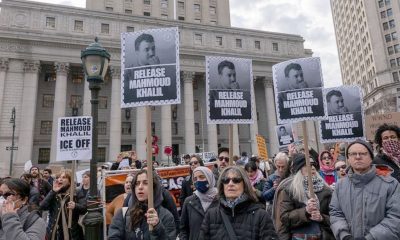
 Features6 days ago
Features6 days agoThe US, Israel, Palestine, and Mahmoud Khalil
-
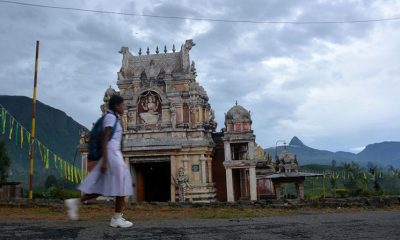
 News6 days ago
News6 days agoScholarships for children of estate workers now open
-
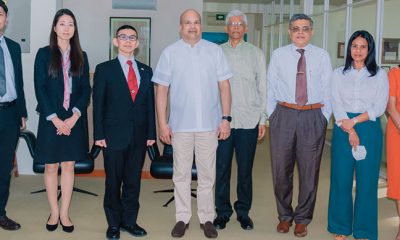
 News7 days ago
News7 days agoDefence Ministry of Japan Delegation visits Pathfinder Foundation
-
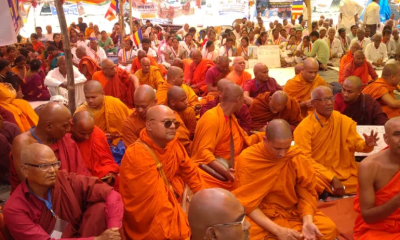
 Foreign News4 days ago
Foreign News4 days agoBuddhism’s holiest site erupts in protests over Hindu ‘control’ of shrine
-
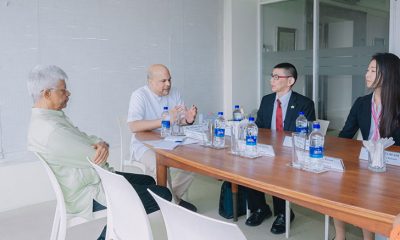
 News6 days ago
News6 days agoJapanese Defence Delegation visits Pathfinder
-

 Editorial7 days ago
Editorial7 days agoWhen promises boomerang
-

 Features3 days ago
Features3 days agoCelebrating 25 Years of Excellence: The Silver Jubilee of SLIIT – PART I











